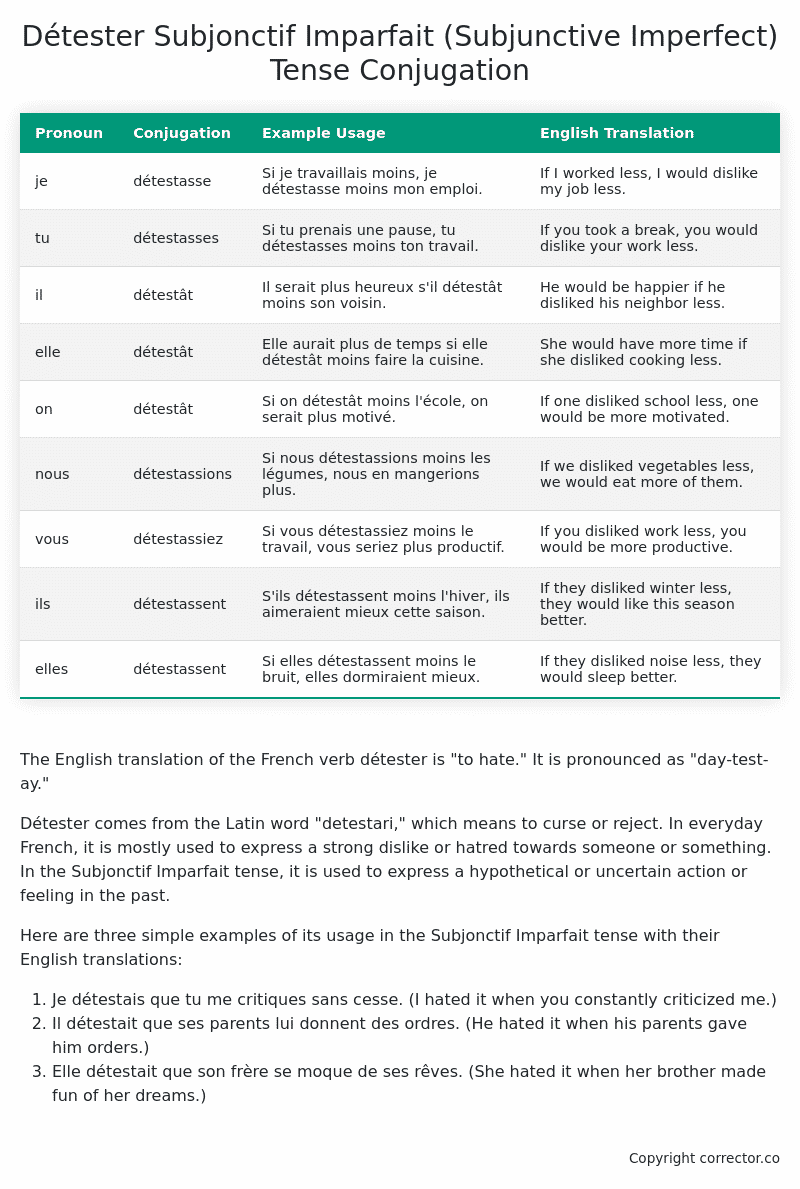Subjonctif Imparfait (Subjunctive Imperfect) Tense Conjugation of the French Verb détester
Introduction to the verb détester
The English translation of the French verb détester is “to hate.” It is pronounced as “day-test-ay.”
Détester comes from the Latin word “detestari,” which means to curse or reject. In everyday French, it is mostly used to express a strong dislike or hatred towards someone or something. In the Subjonctif Imparfait tense, it is used to express a hypothetical or uncertain action or feeling in the past.
Here are three simple examples of its usage in the Subjonctif Imparfait tense with their English translations:
- Je détestais que tu me critiques sans cesse. (I hated it when you constantly criticized me.)
- Il détestait que ses parents lui donnent des ordres. (He hated it when his parents gave him orders.)
- Elle détestait que son frère se moque de ses rêves. (She hated it when her brother made fun of her dreams.)
Table of the Subjonctif Imparfait (Subjunctive Imperfect) Tense Conjugation of détester
| Pronoun | Conjugation | Example Usage | English Translation |
|---|---|---|---|
| je | détestasse | Si je travaillais moins, je détestasse moins mon emploi. | If I worked less, I would dislike my job less. |
| tu | détestasses | Si tu prenais une pause, tu détestasses moins ton travail. | If you took a break, you would dislike your work less. |
| il | détestât | Il serait plus heureux s’il détestât moins son voisin. | He would be happier if he disliked his neighbor less. |
| elle | détestât | Elle aurait plus de temps si elle détestât moins faire la cuisine. | She would have more time if she disliked cooking less. |
| on | détestât | Si on détestât moins l’école, on serait plus motivé. | If one disliked school less, one would be more motivated. |
| nous | détestassions | Si nous détestassions moins les légumes, nous en mangerions plus. | If we disliked vegetables less, we would eat more of them. |
| vous | détestassiez | Si vous détestassiez moins le travail, vous seriez plus productif. | If you disliked work less, you would be more productive. |
| ils | détestassent | S’ils détestassent moins l’hiver, ils aimeraient mieux cette saison. | If they disliked winter less, they would like this season better. |
| elles | détestassent | Si elles détestassent moins le bruit, elles dormiraient mieux. | If they disliked noise less, they would sleep better. |
Other Conjugations for Détester.
Le Present (Present Tense) Conjugation of the French Verb détester
Imparfait (Imperfect) Tense Conjugation of the French Verb détester
Passé Simple (Simple Past) Tense Conjugation of the French Verb détester
Passé Composé (Present Perfect) Tense Conjugation of the French Verb détester
Futur Simple (Simple Future) Tense Conjugation of the French Verb détester
Futur Proche (Near Future) Tense Conjugation of the French Verb détester
Plus-que-parfait (Pluperfect) Tense Conjugation of the French Verb détester
Passé Antérieur (Past Anterior) Tense Conjugation of the French Verb détester
Futur Antérieur (Future Anterior) Tense Conjugation of the French Verb détester
Subjonctif Présent (Subjunctive Present) Tense Conjugation of the French Verb détester
Subjonctif Passé (Subjunctive Past) Tense Conjugation of the French Verb détester
Subjonctif Imparfait (Subjunctive Imperfect) Tense Conjugation of the French Verb détester (this article)
Subjonctif Plus-que-parfait (Subjunctive Pluperfect) Tense Conjugation of the French Verb détester
Conditionnel Présent (Conditional Present) Tense Conjugation of the French Verb détester
Conditionnel Passé (Conditional Past) Tense Conjugation of the French Verb détester
L’impératif Présent (Imperative Present) Tense Conjugation of the French Verb détester
L’infinitif Présent (Infinitive Present) Tense Conjugation of the French Verb détester
Struggling with French verbs or the language in general? Why not use our free French Grammar Checker – no registration required!
Get a FREE Download Study Sheet of this Conjugation 🔥
Simply right click the image below, click “save image” and get your free reference for the détester Subjonctif Imparfait tense conjugation!

Détester – About the French Subjonctif Imparfait (Subjunctive Imperfect) Tense
Formation
Common Everyday Usage Patterns
Interactions with Other Tenses
Subjonctif Présent
Indicatif Passé Composé
Conditional
Conditional Perfect
Summary
I hope you enjoyed this article on the verb détester. Still in a learning mood? Check out another TOTALLY random French verb conjugation!


